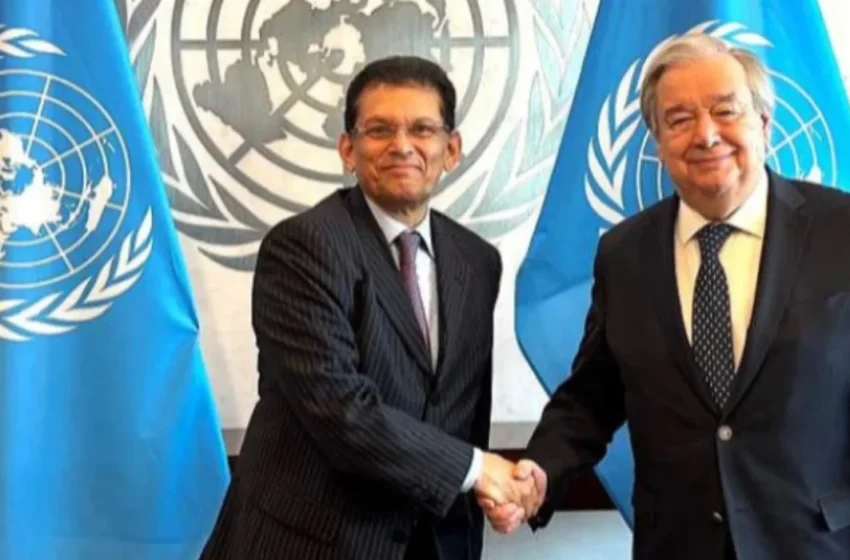
Dhaka urges UN action for Rohingya crisis solution before the 2025 conference
United Nations Secretary-General Antonio Guterres sat down with Dr. Khalilur Rahman, Bangladesh’s High Representative for the Rohingya crisis and priority issues, to talk about the upcoming 2025 UN International Conference on Rohingya Muslims and other Myanmar minorities.
It was the consensus of the UN General Assembly that the conference would be hosted. The UN’s firm commitment to finding a resolution to the Rohingya crisis in the long term was reemphasized by Secretary-General Antonio Guterres.
History of some past humanitarian crises
The Rohingya genocide is the ongoing persecution and murder of the Muslim Rohingya minority by the army of Myanmar. There have been two stages of the genocide so far. The first one was the Army crackdown, which started in 2016 and continued in January 2017. The second one began in 2017. Due to this tragedy, over a million Rohingyas fled to neighboring nations. A good number of them traveled to India, Malaysia, and Thailand, where they were treated inhumanely like animals. In this scenario, some individuals fled to Bangladesh, where the world’s largest refugee camps existed. Most nations refer to such events as ethnic cleansing.
Long-standing Rakhine-Rohingya conflict histories, sociopolitical conflict, socioeconomic underdevelopment, and Burma’s long history of excluding the two groups from its politics are among the causes of the horrific situation in Rakhine State. Rakhine State is the poorest Burmese state and also possesses the highest national poverty rate of 78%, as estimated by the World Bank. The central government’s inefficiency has resulted in poor social services and infrastructure, and a lack of the rule of law has meant a lack of security.
The Burmese government has attributed many types of violence to the Rohingya population, like torture, limited travel, and restrictions on their religious freedom. The government had also imposed limited access to social services and employment. 140,000 Rohingya were displaced from their homes and about 200 were killed due to intergroup violence in 2012. Between 2013 and 2015, Rohingya were also attacked at short intervals.
UN’s response to these crises
According to Khalilur, Bangladesh is willing to support UN-led efforts in the state to stop the humanitarian situation from getting worse, restore livelihoods, and, in the process, create the conditions necessary for the Rohingyas who were forcibly displaced in Bangladesh to return to Rakhine in a voluntary, safe, and dignified manner. He called the Secretary-General’s attention to the worsening external financial situation and asked him to mobilize enough resources through his good offices.
He also asked the Secretary-General to make sure that airstrikes and bombings stop, that relief providers and recipients can access aid without obstacles, and that there is no violence, intimidation, discrimination, or displacement.
He also drew attention to declining external support and called on the Secretary-General to use his leadership to mobilize the required funds.
Secretary-General Guterres welcomed Bangladesh’s eight years of selflessly hosting more than 1.2 million Rohingya refugees. He also welcomed Bangladesh’s role in permitting UN-led relief in Rakhine at this critical juncture.
How does Bangladesh treat the Rohingya?
Thousands of Rohingya began fleeing Myanmar and attempting to make it safely to Bangladesh. The bodies of numerous Rohingya people began washing up on the beaches of the wrecked boats as they attempted to make the Naf River crossing into Bangladesh, and the Myanmar army periodically shelled the fleeing Rohingya with mortar bombs and machine guns.
The head of the UN acknowledged Bangladesh’s vital contribution to the UN-led relief effort in Rakhine during this dire time. Evidence from more than 3,000 witnesses to various serious international crimes has been held in the evidence they have so far gathered.
With yearly expenses topping $1.2 billion, hosting the Rohingya refugees in Bangladesh has significantly strained its already fragile economy and has outweighed the meager UN assistance.
The region’s tourism and agricultural industries have been severely hit by migration; in particular, hotel reservations have decreased by 40% during peak times.
After the acceptance of lower wages by Rohingyas, they enhanced demand for food and basic necessities. This increases demand, causing prices to rise. Due to this increase, many local jobs have been disrupted. Furthermore, it leads to lower wages, expensive food, and fewer healthcare and education services.


